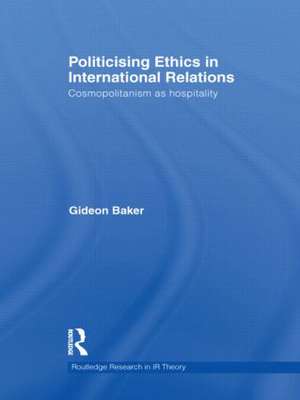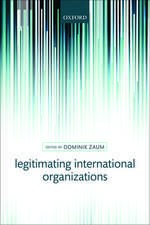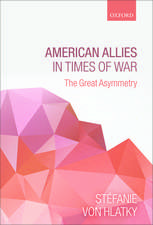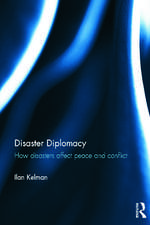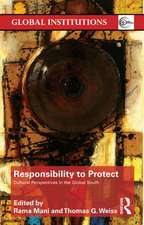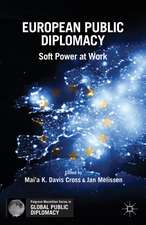Politicising Ethics in International Relations: Cosmopolitanism as Hospitality: Routledge Research in International Relations Theory
Autor Gideon Bakeren Limba Engleză Hardback – 24 feb 2011
Seeking to correct this striking omission, and making an important and original contribution to debates about ethics in international relations in the process, Baker outlines a theory of cosmopolitanism as hospitality which goes beyond existing cosmopolitanisms. He argues that we must understand cosmopolitanism not as the pursuit of a world in which there are no more foreigners but as the welcome of the foreigner. However, though hospitality calls for a welcome, there is always a decision on the welcome to be made. Cosmopolitanism as hospitality is therefore always as much a politics as it is an ethics.
Addressing issues of central concern for those who seek to understand our obligations to strangers, this book will be of interest to students and scholars of international relations, security studies, ethics, and political and international theory.
| Toate formatele și edițiile | Preț | Express |
|---|---|---|
| Paperback (1) | 256.27 lei 6-8 săpt. | |
| Taylor & Francis – 14 oct 2024 | 256.27 lei 6-8 săpt. | |
| Hardback (1) | 819.50 lei 6-8 săpt. | |
| Taylor & Francis – 24 feb 2011 | 819.50 lei 6-8 săpt. |
Preț: 819.50 lei
Preț vechi: 1140.24 lei
-28% Nou
Puncte Express: 1229
Preț estimativ în valută:
156.83€ • 163.13$ • 129.47£
156.83€ • 163.13$ • 129.47£
Carte tipărită la comandă
Livrare economică 14-28 aprilie
Preluare comenzi: 021 569.72.76
Specificații
ISBN-13: 9780415561778
ISBN-10: 0415561779
Pagini: 152
Dimensiuni: 156 x 234 x 15 mm
Greutate: 0.43 kg
Ediția:1
Editura: Taylor & Francis
Colecția Routledge
Seria Routledge Research in International Relations Theory
Locul publicării:Oxford, United Kingdom
ISBN-10: 0415561779
Pagini: 152
Dimensiuni: 156 x 234 x 15 mm
Greutate: 0.43 kg
Ediția:1
Editura: Taylor & Francis
Colecția Routledge
Seria Routledge Research in International Relations Theory
Locul publicării:Oxford, United Kingdom
Public țintă
Academic and PostgraduateCuprins
1. Introduction 2. Towards a Genealogy of Hospitality 3.Spectres of Hospitality 4. Hospitality in the Law of Nature and Nations 5. Kantian Hospitality 6. Hospitality in Emmanuel Levinas’ Totality and Infinity 7. Cosmopolitanism as Hospitality 8. Conclusion: The Politics of Hospitality versus the Biopolitics of Security
Notă biografică
Gideon Baker is Associate Professor in Politics and International Relations in the Department of Politics and Public Policy, Griffith University, Queensland, Australia.
Recenzii
‘Derrida said that hospitality is the whole of ethics. Gideon Baker masterfully substantiates this arresting claim by exploring the politics of hospitality from the Homeric age to Levinas and Derrida.’ - Nicholas Onuf, Professor Emeritus, Florida International University, and Professor Associado, Pontifícia Universidade Católica do Rio de Janeiro
‘Lucidly written and theoretically sophisticated, Politicising Ethics offers a comprehensive discussion of hospitality in international relations. Baker eschews the extremes of universalism and particularism, as well as the tendency to reduce questions of hospitality to matters of either charity or justice. Instead, he convincingly re-introduces the issues at stake as deeply political in nature, requiring judgments and decisions that cannot be relegated to pre-established principles.’ - Roland Bleiker, Professor of International Relations, University of Queensland‘Denaturalizing the debased ways in which liberal democracies receive and relate to their strangers, Baker’s book articulates the more hopeful possibility of a ‘politics of the welcome’, one which offers a substantial contestation of the biopolitical logics of modern (in-)hospitality practices.’ - Julian Reid, Professor of International Relations at the University of Lapland, Finland, and author of The Liberal Way of War (Routledge 2009) and The Biopolitics of the War on Terror (Manchester University Press, 2006).
‘From Odysseus to Derrida, from the polis to the cosmopolis, Gideon Baker offers a genuinely stimulating genealogy of hospitality. Equally adept at engaging with contemporary moral and political philosophy as he is at extracting insights from literature, mythology, and the history of political thought, Baker presents the most comprehensive and important treatment yet in International Relations of hospitality’s ethical and political stakes. Politicizing Ethics in International Relations: Cosmopolitanism as Hospitality is an engaging, erudite, and thought-provoking study of the enduring dilemmas that flow from encounters with strangers.’ - Richard Devetak, Senior Lecturer in International Relations and Director of the Rotary Centre for International Studies in Peace and Conflict Resolution, University of Queensland.
'Baker's comprehensive rethinkingof the cosmopolitan project develops a form of cosmopolitanism that explicitly disavows the option of transcendence in relation to this dichotomy. Rather than retell another 'depressingly familiar' version of the dialectical schema characteristic of statist and globalist resolutions, Baker works within the site of this productive tension between identity and difference in oder to open up the political space for negotiation between each extreme in a way that is irreducible to either option.' -Corey Ranford-Robinson, Millennium
‘Lucidly written and theoretically sophisticated, Politicising Ethics offers a comprehensive discussion of hospitality in international relations. Baker eschews the extremes of universalism and particularism, as well as the tendency to reduce questions of hospitality to matters of either charity or justice. Instead, he convincingly re-introduces the issues at stake as deeply political in nature, requiring judgments and decisions that cannot be relegated to pre-established principles.’ - Roland Bleiker, Professor of International Relations, University of Queensland‘Denaturalizing the debased ways in which liberal democracies receive and relate to their strangers, Baker’s book articulates the more hopeful possibility of a ‘politics of the welcome’, one which offers a substantial contestation of the biopolitical logics of modern (in-)hospitality practices.’ - Julian Reid, Professor of International Relations at the University of Lapland, Finland, and author of The Liberal Way of War (Routledge 2009) and The Biopolitics of the War on Terror (Manchester University Press, 2006).
‘From Odysseus to Derrida, from the polis to the cosmopolis, Gideon Baker offers a genuinely stimulating genealogy of hospitality. Equally adept at engaging with contemporary moral and political philosophy as he is at extracting insights from literature, mythology, and the history of political thought, Baker presents the most comprehensive and important treatment yet in International Relations of hospitality’s ethical and political stakes. Politicizing Ethics in International Relations: Cosmopolitanism as Hospitality is an engaging, erudite, and thought-provoking study of the enduring dilemmas that flow from encounters with strangers.’ - Richard Devetak, Senior Lecturer in International Relations and Director of the Rotary Centre for International Studies in Peace and Conflict Resolution, University of Queensland.
'Baker's comprehensive rethinkingof the cosmopolitan project develops a form of cosmopolitanism that explicitly disavows the option of transcendence in relation to this dichotomy. Rather than retell another 'depressingly familiar' version of the dialectical schema characteristic of statist and globalist resolutions, Baker works within the site of this productive tension between identity and difference in oder to open up the political space for negotiation between each extreme in a way that is irreducible to either option.' -Corey Ranford-Robinson, Millennium
Descriere
Addressing key issues including sovereignty, political community, democracy and international intervention, this book outlines a theory of cosmopolitan politics based on hospitality and makes an important contribution to the debates about cosmopolitanism and ethics in IR.
